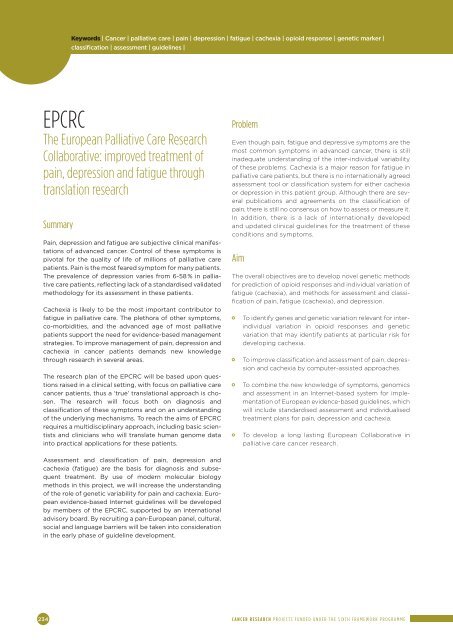You also want an ePaper? Increase the reach of your titles
YUMPU automatically turns print PDFs into web optimized ePapers that Google loves.
EPCRC<br />
The European Palliative Care <strong>Research</strong><br />
Collaborative: improved treatment of<br />
pain, depression and fatigue through<br />
translation research<br />
Summary<br />
Keywords | <strong>Cancer</strong> | palliative care | pain | depression | fatigue | cachexia | opioid response | genetic marker |<br />
classifi cation | assessment | guidelines |<br />
Pain, depression and fatigue are subjective clinical manifestations<br />
of advanced cancer. Control of these symptoms is<br />
pivotal for the quality of life of millions of palliative care<br />
patients. Pain is the most feared symptom for many patients.<br />
The prevalence of depression varies from 6-58 % in palliative<br />
care patients, refl ecting lack of a standardised validated<br />
methodology for its assessment in these patients.<br />
Cachexia is likely to be the most important contributor to<br />
fatigue in palliative care. The plethora of other symptoms,<br />
co-morbidities, and the advanced age of most palliative<br />
patients support the need for evidence-based management<br />
strategies. To improve management of pain, depression and<br />
cachexia in cancer patients demands new knowledge<br />
through research in several areas.<br />
The research plan of the EPCRC will be based upon questions<br />
raised in a clinical setting, with focus on palliative care<br />
cancer patients, thus a ‘true’ translational approach is chosen.<br />
The research will focus both on diagnosis and<br />
classifi cation of these symptoms and on an understanding<br />
of the underlying mechanisms. To reach the aims of EPCRC<br />
requires a multidisciplinary approach, including basic scientists<br />
and clinicians who will translate human genome data<br />
into practical applications for these patients.<br />
Assessment and classifi cation of pain, depression and<br />
cachexia (fatigue) are the basis for diagnosis and subsequent<br />
treatment. By use of modern molecular biology<br />
methods in this project, we will increase the understanding<br />
of the role of genetic variability for pain and cachexia. European<br />
evidence-based Internet guidelines will be developed<br />
by members of the EPCRC, supported by an international<br />
advisory board. By recruiting a pan-European panel, cultural,<br />
social and language barriers will be taken into consideration<br />
in the early phase of guideline development.<br />
Problem<br />
Even though pain, fatigue and depressive symptoms are the<br />
most common symptoms in advanced cancer, there is still<br />
inadequate understanding of the inter-individual variability<br />
of these problems. Cachexia is a major reason for fatigue in<br />
palliative care patients, but there is no internationally agreed<br />
assessment tool or classifi cation system for either cachexia<br />
or depression in this patient group. Although there are several<br />
publications and agreements on the classifi cation of<br />
pain, there is still no consensus on how to assess or measure it.<br />
In addition, there is a lack of internationally developed<br />
and updated clinical guidelines for the treatment of these<br />
conditions and symptoms.<br />
Aim<br />
The overall objectives are to develop novel genetic methods<br />
for prediction of opioid responses and individual variation of<br />
fatigue (cachexia), and methods for assessment and classifi<br />
cation of pain, fatigue (cachexia), and depression.<br />
• To identify genes and genetic variation relevant for interindividual<br />
variation in opioid responses and genetic<br />
variation that may identify patients at particular risk for<br />
developing cachexia.<br />
• To improve classifi cation and assessment of pain, depression<br />
and cachexia by computer-assisted approaches.<br />
• To combine the new knowledge of symptoms, genomics<br />
and assessment in an Internet-based system for implementation<br />
of European evidence-based guidelines, which<br />
will include standardised assessment and individualised<br />
treatment plans for pain, depression and cachexia.<br />
• To develop a long lasting European Collaborative in<br />
palliative care cancer research.<br />
234 CANCER RESEARCH PROJECTS FUNDED UNDER THE SIXTH FRAMEWORK PROGRAMME
















